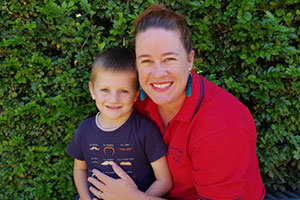
Australia has the unfortunate title of being the food allergy capital of the world. Research from
Murdoch Children's Research Institute found that 1 in 10 Australian infants will suffer from a food allergy and sometimes, these allergies will be lifelong.
The early childhood teacher who saved her own son after severe reaction to peanuts
The first time Kath Webb used an adrenaline auto-injector (EpiPen) on her son Hadley, it was in a kindy room and she was his teacher.
Hadley, then 4, had handed her a partially eaten muesli bar and said, 'I can’t eat this, mummy. It makes me cough'.
Hadley was initially diagnosed with the peanut allergy at 11 months old. Kath later found out the muesli bar was not labelled correctly and contained peanuts.
Kath, the co-director of Goondiwindi Kindergarten, sat him on the floor with a drink of water to 'watch him out of the corner of my eye'.
Minutes later, he vomited and then lost consciousness.
Kath’s anaphylaxis training kicked in. She asked a co-worker to phone triple zero as she grabbed an auto-injector from its secure place in the kitchen.
Kath took the blue cap off the auto-injector and firmly pressed the orange end to Hadley's outer thigh—blue to the sky, orange to the thigh. She kept holding it there after she felt the device click, only releasing the pressure after she had slowly counted to 3.
She massaged the site of the injection as the adrenaline released by the auto-injector flowed through Hadley’s body, constricting his blood vessels, boosting his heartbeat and relaxing his airways.
To Kath’s immense relief, colour and warmth began returning to her son’s body just as the ambulance officers arrived. Kath was thankful her anaphylaxis training was up-to-date.
Kath is now pleased to share another chapter to Hadley's allergy story.
Hadley, now 11 years old, will be finishing primary school at the end of the year. In a life-changing move, he is currently 6 months into an 18-month desensitisation program through the Queensland Allergy Clinic that will 'turn off' his allergy.
The clinic, which requires a referral from a doctor, states on its website that, in some instances, desensitisation to problem allergens such as dust mite and grass pollens can provide an effective 'cure' for problem airway symptoms.
Kath's experience shows that children can present with symptoms of a severe food allergy out of nowhere. A child’s initial exposure to a food allergen, insect bite ointment or medication might present as a mild reaction, but on the next occasion, could be life-threatening.
Her advice to fellow teachers, educators and carers is:
- stay as highly trained as you can
- remain alert to the signs and symptoms of an anaphylactic reaction
- keep lines of communication open with the child's parents
- at the first signs of a severe allergic reaction, call '000'
- always err on the side of caution, particularly for children who have a known allergy.
Be anaphylaxis-ready
Signs and symptoms of anaphylaxis
Visit the
Allergy and Anaphylaxis Australia website to see the signs of a mild to moderate reaction versus an anaphylactic reaction. There’s also a short video that summarises what to look out for.
More information